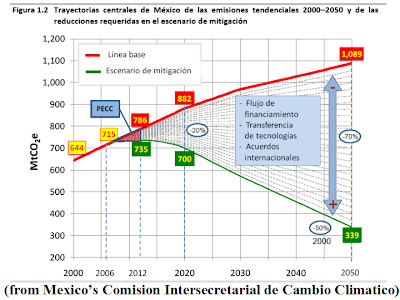CUTTING EMISSIONS IN MEXICO
Report: Reducing Emissions Growth in Emerging Economies Could Be Cheap
Elisabeth Malkin, November 3, 2009 (NY Times)
"How much would it cost to stop increasing greenhouse gas emissions in Mexico? According to [Low-Carbon Development for Mexico], not very much.
"The [World Bank report] estimates that Mexico could flatline its emissions growth, using a variety of measures, for about $64 billion over the next 20 years — or $3 billion annually…just 0.4 percent of the country’s gross domestic product each year… Without the measures, emissions in the country are expected to grow by 73 percent, to 1,137 million tons in 2030…
 click to enlarge
click to enlarge"The report is one of six studies on low-carbon growth in emerging economies that the bank has been carrying out — though it is the only one likely to be ready before the United Nations climate change conference next month in Copenhagen. The other analyses — for China, India, Brazil, South Africa and Indonesia – have been stalled by bureaucracy or by governments’ reluctance to provide data ahead of the global negotiations…
"The Mexican government, meanwhile, published its Special Program on Climate Change, which proposes to reduce carbon emissions by 11 percent over 2000 levels by 2030. The bank has granted Mexico $2.7 billion in loans during 2008 to 2009 to support environmental sustainability…"
 click to enlarge
click to enlarge"For Mexico, the costs of not moving ahead are already clear. The country is likely to suffer disproprotionately from the effects of climate change through a combination of drought, more violent storms and damage to its fertile Gulf Coast wetlands.
"The World Bank study proposes 40 measures that can be implemented at low cost — including switching to more energy-efficient appliances; investing in renewable energy, particularly wind power; avoiding deforestation by managing forests; and, promoting public transport, especially bus rapid-transit systems…The forestry sector offers the single greatest potential for reducing greenhouse gas emissions…[through] measures that would reduce deforestation and forest degradation."








0 Comments:
Post a Comment
<< Home